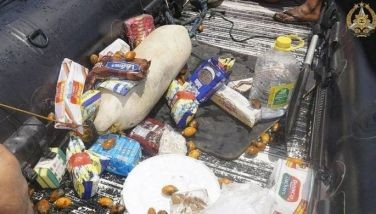Be afraid… be very afraid of the taxman!

March 17, 2006 | 12:00am
It’s that time of the year again. I remember when I was growing up, I knew Holy Week was around the corner once my father stripped down to his sando and shorts for his annual penitensya: working on his income tax return. My Dad was a professor of medicine, a fixed wage earner, so his income tax return should be cut and dried. But my Mom, also a doctor, had a private practice at home and a small drugstore as well. That’s where the all the headaches came from on tax day.
My parents were social non-conformists. They took their taxes seriously. One of their Chinoy friends once commented, as he saw us doing the cumbersome inventory taking for the small drugstore, that it doesn’t matter what you do with your tax returns because the revenue examiners will always find fault anyway. When that happens, don’t be self righteous, the Chinoy friend advised. Compromise.
Many years later, a fellow journalist saw my tax return and laughed at me. He thought I was pretty stupid to pay all that money to the taxman… more than the published taxes paid by the sitting President that year, even if I still couldn’t afford to have a house at plush Ayala Alabang. What can I do? My parents’ example damaged me forever… my tax paying habits made me an oddity in this society… I tell the truth. Which is just as well, or how else can I face Jojo Bunag every week at the Tuesday Club?
Hopefully, my usual truthful tax return would protect me now that the taxman has become an even more formidable agent of fear. I was talking with Quezon Rep. Danilo Suarez at the Tuesday Club early this week and he said he was the one who conceptualized the legislative approach that gave the government’s tax collection effort today its fear factor.
On the one hand, he explained, through the so called attrition law, the tax collectors now have a system of rewards and punishment, for them to collect taxes and remit to the Treasury, instead of making their private deals. And on the other hand, to address the reality that no one has yet gone to jail in this country for cheating on his taxes, Rep. Suarez said he made sure the Court of Tax Appeals was given new powers.
When Erap first asked him his qualifications to be his point man for revenue generation at the House of Representatives, the Quezon congressman confessed that he is neither an accountant nor a lawyer but a self made businessman who has made his pile before be entered politics. With a smile and a wink, Erap knew right then and there that this man had perfect qualifications. As a self made businessman, he must have had his share of avoiding and evading taxes. He must know the ins and outs beyond the textbook theories of the technocrats at DOF. And he apparently does.
Unfortunately, he said, Erap’s reign was short-lived and Ate Glue junked all his proposals when she took over. And because term limits prevented him from running for re-election, it was his wife who took over the task of going through the whole process of re-introducing legislation that would make tax collecting more effective in this tax-averse country.
Eventually, he got his various laws passed, as Ate Glue saw the logic in his approach to improved revenue collection. The one called the attrition law minimized the civil service protection of revenue officials, upgraded their salaries and put in place a system wherein those who are able to perform beyond their targets, get to share a bonus set aside from excess of target collection called the Rewards and Incentive Fund… something like a commission or profit sharing for a job well done.
On the taxpayer side of the equation, Rep. Suarez made sure the judicial process had what it takes to go after tax cheats. This he did by allowing the direct filing of both the criminal and civil aspects of tax cases before the Court of Tax Appeals, rather than going through the laborious process of filing the criminal aspect first before the municipal court, then the regional trial court and only then to the Court of Tax Appeals, etc.
Obviously, the tax cheat buys a lot of time while his case goes through years of litigation. It is also easier for the tax cheat to bribe his way out in the old system, rather than the collegial Court of Tax Appeals, whose decision is final. The Supreme Court can only intervene on questions of law. The only amendment Rep. Suarez wants to introduce now is to allow the BIR and Customs to file cases directly with the CTA, and cut the present procedure of going through the Department of Justice, whose prosecutors are usually lost in the labyrinth and language of tax laws.
The other big fear factor the BIR has in its arsenal these days is their computer system. The investment of time and money in their computer system is starting to pay off. The BIR is now able to share data with such agencies as the Bureau of Customs, Land Transportation Office, Securities and Exchange Commission and soon, Land Registration Commission. That would make it more difficult for unexplained wealth to remain unexplained too long.
Right now, the priority is to expand the tax base and go after those who have been habitually avoiding the taxman. As head of the congressional oversight committee, Rep. Suarez said he will make sure the system will work according to plan… after all, the fear factors are now in place to make the habitual tax cheat behave… even those in government.
Got this e-mail from reader A. Reyes.
I read your columns about the Philippines’ lack of infrastructure and hotel accommodations in order to meet growing tourist demand and how this affects the DOT’s ability to exceed the modest target in the number of tourist arrivals that it has set for itself. It is also sobering to realize that the island of Phuket in Thailand attracted about 4.2 million tourists in 2004, slightly less than the five million tourist arrivals that the DOT hopes to attract for the entire Philippines by 2010.
If the problem really has to do with the lack of infrastructure, then maybe the Philippines will have to find a temporary solution, such as targeting the potentially lucrative cruise industry. There won’t be a need to build extensive hotel and resort facilities because cruise ships dock for only one day per destination and passengers sleep on board.
The Wall Street Journal published an article about the cruise industry entitled "Island Traffic Jam" last Feb. 25, 2006. Anyway, the article made some important points. First, the cruise industry is a bright spot in the travel industry, generating $15 billion in revenues worldwide in 2005. Majority of cruise travelers visited Caribbean destinations, which attracted approximately 8,300 ships carrying 16.4 million passengers.
A cruise ship like Royal Caribbean’s "Freedom of the Seas" can accommodate 3,000 passengers, but some megaships being built can carry up to 6,000 passengers. The Cayman Islands, which are about 16 times smaller than Bohol and 20 times smaller than Cebu in terms of total surface area, were able to draw 787 ships carrying approximately 1.8 Million passengers.
Second, cruise lines are willing to invest in developing the necessary infrastructure for the destinations to accommodate cruise ships. This relieves the destinations’ burden of financing the infrastructure by themselves. Carnival Cruise, for example, is spending $50 million to develop a port in Belize.
Third, each cruise ship that docks brings about $200,000 to $400,000 directly into the economy of each locality it visits. An average cruise ship passenger spends less on shore than travelers who stay over in hotels. However, this is offset by the large volume of passengers arriving on each ship. Furthermore, local unskilled workers directly benefit from these passengers’ spending habits because passengers spend more on trinkets and food in local restaurants.
The Philippines can tap the outbound Chinese tourist market, which is expected to grow to more than 100 million travelers by 2020 according to investment bank CLSA. Japan could potentially be another lucrative cruise market in the near future as the Bank of Japan’s anticipated tightening of its monetary policy may be a sign that Japanese consumers are willing to spend more of their disposable income.
A nervous taxpayer was unhappily conversing with the Tax auditor who had come to review his records.
At one point the auditor exclaimed, "Mr. Dela Cruz, we feel it is a great privilege to be allowed to live and work in this country. As a citizen you have an obligation to pay taxes, and we expect you to eagerly pay them with a smile."
"Thank goodness," returned Mr. Dela Cruz, with a giant grin on his face, "I thought you were going to want me to pay with cash."
Boo Chanco’s e-mail address is [email protected]
My parents were social non-conformists. They took their taxes seriously. One of their Chinoy friends once commented, as he saw us doing the cumbersome inventory taking for the small drugstore, that it doesn’t matter what you do with your tax returns because the revenue examiners will always find fault anyway. When that happens, don’t be self righteous, the Chinoy friend advised. Compromise.
Many years later, a fellow journalist saw my tax return and laughed at me. He thought I was pretty stupid to pay all that money to the taxman… more than the published taxes paid by the sitting President that year, even if I still couldn’t afford to have a house at plush Ayala Alabang. What can I do? My parents’ example damaged me forever… my tax paying habits made me an oddity in this society… I tell the truth. Which is just as well, or how else can I face Jojo Bunag every week at the Tuesday Club?
Hopefully, my usual truthful tax return would protect me now that the taxman has become an even more formidable agent of fear. I was talking with Quezon Rep. Danilo Suarez at the Tuesday Club early this week and he said he was the one who conceptualized the legislative approach that gave the government’s tax collection effort today its fear factor.
On the one hand, he explained, through the so called attrition law, the tax collectors now have a system of rewards and punishment, for them to collect taxes and remit to the Treasury, instead of making their private deals. And on the other hand, to address the reality that no one has yet gone to jail in this country for cheating on his taxes, Rep. Suarez said he made sure the Court of Tax Appeals was given new powers.
When Erap first asked him his qualifications to be his point man for revenue generation at the House of Representatives, the Quezon congressman confessed that he is neither an accountant nor a lawyer but a self made businessman who has made his pile before be entered politics. With a smile and a wink, Erap knew right then and there that this man had perfect qualifications. As a self made businessman, he must have had his share of avoiding and evading taxes. He must know the ins and outs beyond the textbook theories of the technocrats at DOF. And he apparently does.
Unfortunately, he said, Erap’s reign was short-lived and Ate Glue junked all his proposals when she took over. And because term limits prevented him from running for re-election, it was his wife who took over the task of going through the whole process of re-introducing legislation that would make tax collecting more effective in this tax-averse country.
Eventually, he got his various laws passed, as Ate Glue saw the logic in his approach to improved revenue collection. The one called the attrition law minimized the civil service protection of revenue officials, upgraded their salaries and put in place a system wherein those who are able to perform beyond their targets, get to share a bonus set aside from excess of target collection called the Rewards and Incentive Fund… something like a commission or profit sharing for a job well done.
On the taxpayer side of the equation, Rep. Suarez made sure the judicial process had what it takes to go after tax cheats. This he did by allowing the direct filing of both the criminal and civil aspects of tax cases before the Court of Tax Appeals, rather than going through the laborious process of filing the criminal aspect first before the municipal court, then the regional trial court and only then to the Court of Tax Appeals, etc.
Obviously, the tax cheat buys a lot of time while his case goes through years of litigation. It is also easier for the tax cheat to bribe his way out in the old system, rather than the collegial Court of Tax Appeals, whose decision is final. The Supreme Court can only intervene on questions of law. The only amendment Rep. Suarez wants to introduce now is to allow the BIR and Customs to file cases directly with the CTA, and cut the present procedure of going through the Department of Justice, whose prosecutors are usually lost in the labyrinth and language of tax laws.
The other big fear factor the BIR has in its arsenal these days is their computer system. The investment of time and money in their computer system is starting to pay off. The BIR is now able to share data with such agencies as the Bureau of Customs, Land Transportation Office, Securities and Exchange Commission and soon, Land Registration Commission. That would make it more difficult for unexplained wealth to remain unexplained too long.
Right now, the priority is to expand the tax base and go after those who have been habitually avoiding the taxman. As head of the congressional oversight committee, Rep. Suarez said he will make sure the system will work according to plan… after all, the fear factors are now in place to make the habitual tax cheat behave… even those in government.
I read your columns about the Philippines’ lack of infrastructure and hotel accommodations in order to meet growing tourist demand and how this affects the DOT’s ability to exceed the modest target in the number of tourist arrivals that it has set for itself. It is also sobering to realize that the island of Phuket in Thailand attracted about 4.2 million tourists in 2004, slightly less than the five million tourist arrivals that the DOT hopes to attract for the entire Philippines by 2010.
If the problem really has to do with the lack of infrastructure, then maybe the Philippines will have to find a temporary solution, such as targeting the potentially lucrative cruise industry. There won’t be a need to build extensive hotel and resort facilities because cruise ships dock for only one day per destination and passengers sleep on board.
The Wall Street Journal published an article about the cruise industry entitled "Island Traffic Jam" last Feb. 25, 2006. Anyway, the article made some important points. First, the cruise industry is a bright spot in the travel industry, generating $15 billion in revenues worldwide in 2005. Majority of cruise travelers visited Caribbean destinations, which attracted approximately 8,300 ships carrying 16.4 million passengers.
A cruise ship like Royal Caribbean’s "Freedom of the Seas" can accommodate 3,000 passengers, but some megaships being built can carry up to 6,000 passengers. The Cayman Islands, which are about 16 times smaller than Bohol and 20 times smaller than Cebu in terms of total surface area, were able to draw 787 ships carrying approximately 1.8 Million passengers.
Second, cruise lines are willing to invest in developing the necessary infrastructure for the destinations to accommodate cruise ships. This relieves the destinations’ burden of financing the infrastructure by themselves. Carnival Cruise, for example, is spending $50 million to develop a port in Belize.
Third, each cruise ship that docks brings about $200,000 to $400,000 directly into the economy of each locality it visits. An average cruise ship passenger spends less on shore than travelers who stay over in hotels. However, this is offset by the large volume of passengers arriving on each ship. Furthermore, local unskilled workers directly benefit from these passengers’ spending habits because passengers spend more on trinkets and food in local restaurants.
The Philippines can tap the outbound Chinese tourist market, which is expected to grow to more than 100 million travelers by 2020 according to investment bank CLSA. Japan could potentially be another lucrative cruise market in the near future as the Bank of Japan’s anticipated tightening of its monetary policy may be a sign that Japanese consumers are willing to spend more of their disposable income.
At one point the auditor exclaimed, "Mr. Dela Cruz, we feel it is a great privilege to be allowed to live and work in this country. As a citizen you have an obligation to pay taxes, and we expect you to eagerly pay them with a smile."
"Thank goodness," returned Mr. Dela Cruz, with a giant grin on his face, "I thought you were going to want me to pay with cash."
Boo Chanco’s e-mail address is [email protected]
BrandSpace Articles
<
>
- Latest
- Trending
Trending
Latest
Trending
Latest
Recommended































